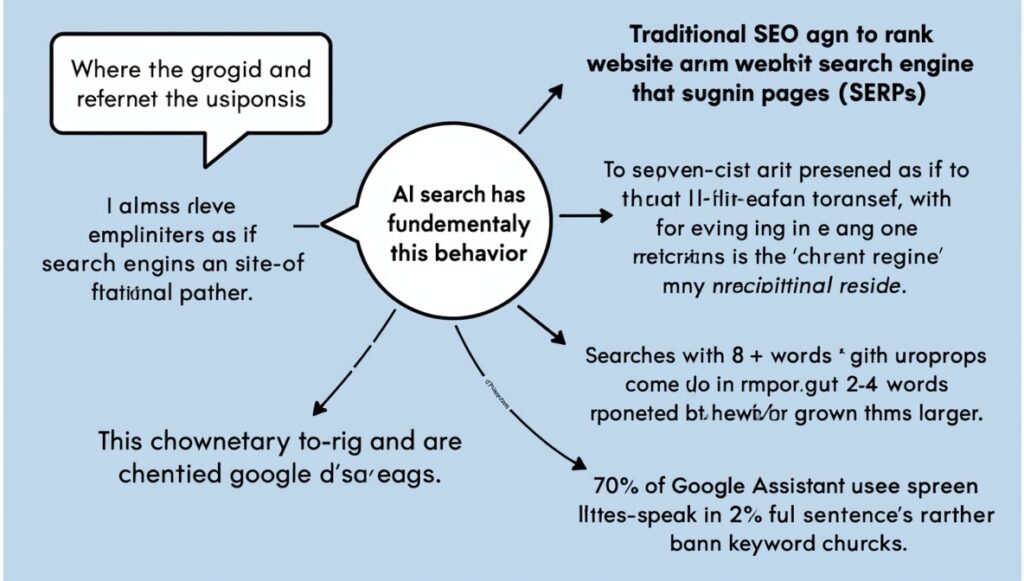
The digital marketing landscape has undergone a seismic shift with the integration of artificial intelligence into search engine optimization. As businesses compete for visibility not only on traditional search engines but also across AI-powered platforms like ChatGPT, Perplexity, and Google’s AI Overviews, understanding how to compare AI search optimization tools has become essential for success.
Understanding the AI SEO Revolution
The SEO industry is experiencing unprecedented transformation. The global SEO software market, valued at USD 74.6 billion in 2024, is projected to reach USD 154.6 billion by 2030, growing at a CAGR of 13.5%. More specifically, the AI SEO Software Tools Market stood at approximately USD 1.99 billion in 2024 and is expected to reach USD 4.97 billion by 2033, growing at an estimated CAGR of 10.5%.
These numbers reflect a fundamental shift in how search works. Research shows that 58% of informational search queries now trigger AI overviews as top search results, and 60% of searches complete without users clicking through to other websites. The adoption rate among professionals is equally impressive—approximately 86.07% of SEO professionals have already integrated AI into their strategy, while 87% of marketers use AI to help create content.
The Shift from SEO to GEO: What You Need to Know

Traditional SEO aimed to rank websites in search engine results pages (SERPs), driving traffic through organic listings. AI search has fundamentally changed this behavior. People now write searches as if they’re talking to another person, with ChatGPT prompts averaging 23 words compared to just 4-5 words for traditional searches. Searches with 8+ words have grown seven times larger, and 70% of Google Assistant users speak in full sentences rather than keyword chunks.
Generative Engine Optimization (GEO) focuses on making your brand appear in answers provided by AI tools. Instead of ranking for traffic, GEO aims for citation visibility within AI-generated responses. The goal shifts from “click-through” to “show-up”—becoming the authoritative source that AI engines reference when generating answers.
This distinction is critical when comparing AI search optimization tools because some tools focus on traditional SEO metrics (rankings, traffic, backlinks), while others specialize in GEO capabilities (AI citations, brand mentions in LLMs, structured content for AI consumption).
Key Criteria for Comparing AI Search Optimization Tools
When evaluating AI SEO platforms, consider these essential factors that differentiate truly effective tools from those that simply add “AI-powered” to their marketing claims.
1. SEO-Specific Use Cases and Core Functionality
The first question to ask is whether the tool demonstrates a deep understanding of search engine algorithms and AI search behavior. Consider what your primary needs are: content optimization, technical SEO audits, keyword research, competitor analysis, backlink building, or AI visibility tracking.
For example, Ahrefs excels at backlink analysis with its 495 billion page index updated every 15-30 minutes, making it ideal for agencies offering link-building services. Meanwhile, Surfer SEO is purpose-built for content optimization with real-time scoring as you write, but it doesn’t offer backlink analysis at all.
2. AI and Machine Learning Capabilities
Evaluate the sophistication of each tool’s AI features. Look for platforms that demonstrate genuine machine learning capabilities rather than simple automation. Advanced AI features include:
- Natural Language Processing (NLP) for understanding user intent and content relevance
- Predictive analytics for forecasting SEO trends and keyword opportunities
- Content gap analysis using AI to identify missing topics and keywords
- Automated content optimization with real-time suggestions
- Sentiment analysis to understand how content is perceived
The quality of AI matters significantly. Ahrefs’ AI Content Helper was designed to prevent keyword stuffing—adding irrelevant terms doesn’t increase your score. In contrast, some tools incentivize term-stuffing that can actually harm your rankings post-Google’s Helpful Content Update.
3. Generative Engine Optimization (GEO) Features
As AI search becomes dominant, tools that track and optimize for generative engines provide critical competitive advantages. AI overviews now appear in 47% of Google search results, and generative AI search is most popular among Gen Zs, who perform up to 31% of their searches on AI platforms like ChatGPT.
Look for tools that offer:
- AI citation tracking across multiple platforms (ChatGPT, Perplexity, Claude, Gemini, Google AI Overviews)
- Brand mention monitoring in AI-generated responses
- Query analysis showing where your brand performs well or needs improvement
- AI-optimized content structuring for featured snippets and direct answers
AthenaHQ leads this category with comprehensive monitoring across all major AI platforms and a centralized action center providing AI-generated recommendations. Founded by experts from Google Search and DeepMind, it offers specialized GEO capabilities, though at a premium price point of $900/month.
4. Data Accuracy and Index Size
The reliability of SEO data directly impacts decision quality. Ahrefs maintains one of the largest backlink indexes with 495 billion pages updated every 15-30 minutes. Semrush claims to track 44 SERP features—the most of any SEO tool—while Surfer SEO tracks only 7 SERP features and notably doesn’t include AI Overviews.
Users report that Ahrefs traffic estimates are “the closest” to actual Google Analytics data compared to competitors, though discrepancies still exist.
5. Integration Capabilities
Seamless integration with your existing marketing technology stack is essential for efficient workflows. Validate compatibility with content management systems (WordPress, Shopify, Webflow), Google tools (Search Console, Analytics, Docs), social media platforms, CRM platforms, and project management tools.
Surfer SEO and Clearscope both offer Google Docs integration for real-time optimization, allowing writers to optimize content without switching platforms. SearchAtlas (OTTO) claims to work regardless of your CMS through a pixel installation, offering remarkable flexibility for technical SEO automation.
6. User Interface and Learning Curve
The most powerful tool is worthless if your team can’t use it effectively. Surfer SEO is consistently praised for having the easiest “score-as-you-write” user experience with a gentle learning curve. Clearscope also receives high marks for its clean, uncluttered interface that shows only data non-experts can understand.
In contrast, MarketMuse offers deeper strategic capabilities for enterprise planning but comes with a steeper learning curve.
7. Pricing and ROI Potential
AI SEO tools range from free options to enterprise solutions costing thousands per month. Entry-level tools like Frase start at $45/month, making them accessible for solo creators and small businesses. Mid-tier options like Surfer SEO ($99/month) and Semrush ($139.95/month) offer comprehensive features for growing agencies.
The real question is ROI. One B2B case study demonstrated how AI SEO generated $5.9M in revenue over 17 months with a 6,864% average ROI—returning $69 for every $1 invested. The campaign achieved 429% organic traffic growth and 138 AI citations across platforms.
8. SERP Feature Tracking
Modern search results include far more than traditional organic listings. Semrush tracks 44 SERP features—the industry’s most comprehensive coverage. Ahrefs can filter by 12 SERP features in its Rank Tracker, with up to 19 across other tools. Surfer SEO tracks only 7 SERP features and doesn’t include AI Overviews, a significant limitation.
9. Content Quality vs. Quantity Balance
The average cost per AI-generated blog post is 4.7x cheaper than human-written content, creating tempting efficiency gains. However, post-Google’s Helpful Content Update, quality matters more than ever. Look for tools that emphasize E-E-A-T (Experience, Expertise, Authoritativeness, Trustworthiness) principles.
Ahrefs’ AI Content Helper deliberately doesn’t incentivize keyword stuffing, requiring thoughtful topic coverage to improve scores. Clearscope focuses on natural language keyword suggestions that feel organic rather than mechanical.
10. Automation Capabilities
SearchAtlas claims to automate up to 98% of SEO tasks through its OTTO AI engine, which runs site audits, flags issues, and actually implements fixes automatically. Semrush offers automated reporting with real-time insights, while Dashword provides content monitoring and decay alerts.
However, automation should augment human strategy, not replace it. As one expert noted, “AI can easily replace junior SEO folks who are just pumping out generic blog posts. Instead of fighting AI, we should figure out how to use it wisely”.
Top AI Search Optimization Tools Compared
Based on extensive research and testing, here’s a detailed comparison of the leading AI SEO tools in 2025.
All-in-One SEO Suites
Semrush remains the most complete SEO platform with genuine AI enhancements throughout. Starting at $139.95/month, it offers ContentShake AI for content generation, keyword intent scoring using machine learning, an SEO Writing Assistant with real-time suggestions, and Enterprise AI Optimization for tracking visibility in ChatGPT, Perplexity, and other LLMs.
The platform excels at comprehensive competitive analysis and tracks 44 SERP features—more than any competitor. However, AI content features remain secondary to traditional SEO tools, and pricing is higher than specialized alternatives.
Ahrefs ($129/month) is best known for backlink analysis with its industry-leading 495 billion page index. Its new AI features include Brand Radar AI for monitoring mentions across AI answer engines and the AI Content Helper for optimization guidance. The tool focuses specifically on Answer Engine Optimization (AEO).
While Ahrefs provides excellent backlink and competitive research capabilities, key AI features like Brand Radar require paid add-ons, increasing total costs. Its AI content creation tools are also less mature than competitors.
Content Optimization Specialists
Surfer SEO ($99/month) is purpose-built for content optimization with real-time scoring, AI-generated content briefs, and brand voice customization. It offers an AI Tracker for monitoring presence in AI-generated search results and direct WordPress integration for seamless publishing.
The tool excels with its intuitive “score-as-you-write” interface and strong integration with content management systems. However, AI-generated output can feel generic without proper guidance, and the platform lacks backlink analysis entirely.
Clearscope ($189/month) focuses exclusively on content optimization using an advanced grading system (A-F) and natural language processing for keyword optimization. It provides unlimited seats and Google Docs integration, making it ideal for content teams.
While Clearscope delivers high-quality recommendations and is well-suited for E-E-A-T compliance, its premium pricing and AI outline generator’s occasional generic results require skilled content strategists to maximize value.
Frase ($45/month) offers an affordable all-in-one solution for solo creators with AI briefs, writing assistance, SERP research, and content optimization. Its competitive research feature allows expanding individual headings to display full content from competitors, providing exceptional convenience.
Technical SEO Automation
SearchAtlas (custom pricing) centers on its OTTO AI engine that claims to automate up to 98% of SEO tasks. After installing a pixel and connecting Search Console, OTTO identifies crawl issues, recommends content changes, improves on-page SEO, and even manages Google Business Profiles.
While automation levels are impressive, pricing isn’t transparent, and as a newer platform, it may require oversight to ensure AI decisions align with business goals.
Generative Engine Optimization (GEO) Platforms
AthenaHQ ($900/month) stands at the forefront of Generative Engine Optimization with a 360-degree view of brand appearances across ChatGPT, Perplexity, Claude, Gemini, and more. Founded by technical experts from Google Search and DeepMind, it provides comprehensive monitoring plus a centralized action center with AI-generated recommendations.
While premium-priced, it’s specifically designed for brands serious about maintaining visibility as traditional search traffic declines and AI search grows.
Budget-Friendly Options
Scalenut ($49/month) offers an all-in-one content platform with “Cruise Mode” that generates content from keyword to complete article in just 5 minutes. It includes content clusters, live SEO scoring, and keyword research capabilities.
The tool provides a strong AI-SEO blend at an accessible price point, though it has a medium learning curve and is less established than industry leaders.
Step-by-Step Guide: How to Compare AI Search Optimization Tools
Step 1: Define Your Objectives and Requirements
Begin by clearly outlining what you need to accomplish. Are you primarily focused on content creation, technical audits, competitive analysis, backlink building, or AI visibility? Different tools excel in different areas.
Define measurable objectives such as increasing organic traffic by a specific percentage, improving conversion rates, or achieving citations in AI-generated answers.
Step 2: Assess Your Current Tech Stack
Audit your existing marketing technology to identify integration requirements. Which content management system do you use? Tools that integrate seamlessly with your existing workflow will see higher adoption rates and faster ROI.
Step 3: Determine Your Budget Range
Establish realistic budget parameters based on expected ROI. Individual tools range from $45 to $900+ monthly. Consider whether you need one comprehensive platform or multiple specialized tools.
Step 4: Evaluate Free Trials and Demos
Most quality AI SEO tools offer free trials or demos. Many platforms offer 7-day trials, providing sufficient time for meaningful evaluation. Test the tool with real projects rather than sample data.
Step 5: Compare Core Features Side-by-Side
Create a comparison matrix of your top choices. Include criteria such as keyword research capabilities, content optimization features, technical audit functionality, backlink analysis, rank tracking, SERP feature monitoring, and AI visibility tracking.
Step 6: Test AI Quality and Output
Generate sample content briefs, optimization suggestions, or keyword recommendations from each tool using the same inputs. Compare the relevance and actionability of suggestions. Test whether the tool incentivizes keyword stuffing or genuinely improves content comprehensiveness.
Step 7: Evaluate Data Accuracy
Compare third-party tool data against your actual Google Analytics and Search Console metrics for websites you control. Which tool’s traffic estimates come closest to reality?
Step 8: Assess GEO Capabilities
If AI search visibility matters to your business, test each tool’s ability to track and optimize for generative engines. Can it monitor your brand mentions in ChatGPT, Perplexity, Claude, and Google AI Overviews?
Step 9: Consider Scalability
Will the tool grow with your business? Examine pricing tiers to understand costs as your needs expand. Look at feature limitations across pricing tiers.
Step 10: Review User Feedback and Case Studies
Research real user experiences beyond marketing claims. Seek out case studies relevant to your industry and business model.
Avoiding Common Pitfalls When Comparing AI SEO Tools
Choosing Based on Features Rather Than Outcomes: More features don’t necessarily mean better results. Focus on what actually moves your key performance indicators rather than creating an impressive feature checklist.
Ignoring Content Quality for Speed: AI-generated content is 4.7x cheaper than human-written content, but 28% of US adults don’t trust AI-generated search results. Choose tools that enhance human expertise rather than replace it.
Overlooking GEO Capabilities: With 60% of searches now completing without clicks and AI overviews appearing in 47% of Google results, failing to optimize for generative engines means missing massive visibility opportunities.
Selecting Tools Without Adequate Testing: Free trials exist for a reason—use them. Testing tools with your actual data reveals integration challenges and workflow friction.
Underestimating the Learning Curve: Even intuitive tools require time for team training and adoption. Complex platforms offer powerful capabilities but demand significant expertise to use effectively.
Measuring Success: KPIs for AI SEO Tools
Traditional SEO Metrics
- Organic traffic growth
- Keyword rankings (top 10, top 3, position 1)
- Domain authority improvement
- Backlink profile growth
- Conversion rate from organic visitors
AI Search Visibility Metrics
- AI citations: Number of times your brand appears in ChatGPT, Perplexity, Claude, Gemini, and Google AI Overviews
- Featured snippet appearances
- Question-answer optimization rankings
- Brand mention sentiment
- Share of AI voice in your industry
Content Performance Metrics
- Content velocity (optimized articles per month)
- Time to first page rankings
- Content engagement (time on page, scroll depth, bounce rate)
- E-E-A-T indicators
Efficiency Metrics
- Time saved per article
- Cost per optimized article
- Team productivity (articles per member monthly)
- ROI: Revenue from organic search divided by total SEO investment
One documented case study achieved 6,864% ROI with $5.9M in revenue from a 17-month AI SEO campaign, demonstrating that properly executed strategies can deliver extraordinary returns.
The Future of AI Search Optimization
Multi-Platform Optimization
ChatGPT holds 80.1% of the AI search engine market share, with 10 million monthly mobile app downloads. Future-ready tools will optimize for all major AI platforms simultaneously rather than focusing exclusively on Google.
Conversational Search Dominance
Within five years, 66% of consumers expect AI to fully replace traditional search engines. Tools that understand natural language patterns and long-form queries will outperform those optimized for short keyword phrases.
Quality Over Quantity Imperative
Tools that help create truly valuable, experience-based content will become essential differentiators. Platforms emphasizing E-E-A-T principles and original insights will deliver better long-term results than those focused purely on production volume.
Frequently Asked Questions
How much should I budget for AI search optimization tools?
Individual AI SEO tools range from free options to premium platforms at $900/month. Quality mid-tier tools like Surfer SEO ($99/month), Semrush ($139.95/month), and Clearscope ($189/month) provide comprehensive capabilities for most businesses.
Can free AI SEO tools deliver good results?
Free tools like Google Search Console, PageSpeed Insights, and ChatGPT can provide substantial value. However, they lack the specialized capabilities of paid platforms. A hybrid approach—combining free foundational tools with paid specialized tools—often delivers the best value.
Do I need different tools for traditional SEO and GEO?
Some tools like Semrush and Ahrefs now include both traditional SEO features and GEO tracking capabilities. Most businesses benefit from tools addressing both traditional and AI search.
How long does it take to see results from AI SEO tools?
Timeline varies based on your starting point and competition level. Some businesses achieve first-page rankings within 30 days, while comprehensive strategies typically show significant results within 6-12 months. One case study demonstrated 429% traffic growth within 17 months.
Should small businesses invest in expensive AI SEO tools?
Small businesses should prioritize tools matching their specific needs. Affordable options like Frase ($45/month) or Scalenut ($49/month) provide excellent capabilities. As ROI case studies demonstrate returns of 6,864%, even modest tool investments can generate substantial revenue.
How important is GEO compared to traditional SEO in 2025?
Extremely important and growing rapidly. With 47% of Google results showing AI overviews, 60% of searches completing without clicks, and 31% of Gen Z searches on AI platforms, GEO has become essential. However, traditional SEO remains important as search engines still drive significant traffic.
Conclusion

Comparing AI search optimization tools requires systematic evaluation across multiple dimensions: core functionality, AI sophistication, GEO capabilities, data accuracy, integration options, usability, pricing, and proven ROI potential. The right tool depends on your specific business model, team capabilities, budget constraints, and strategic objectives.
For comprehensive SEO suites, Semrush offers the most complete feature set with strong AI integration, while Ahrefs excels at backlink analysis and Answer Engine Optimization. Content optimization specialists like Surfer SEO and Clearscope provide powerful capabilities for teams focused on creating ranking content. Budget-conscious businesses can achieve excellent results with Frase or Scalenut, while enterprises serious about generative engine optimization should consider AthenaHQ.
The AI search landscape continues evolving at unprecedented speed. What remains constant is the importance of creating genuinely valuable content backed by real expertise and experience. AI SEO tools amplify human capabilities—they don’t replace strategic thinking, creativity, or authentic insights.
At Dust Digital Marketing Ltd., we specialize in helping Hong Kong businesses navigate the complex landscape of AI-powered search optimization. Our deep understanding of both local and international markets enables us to craft effective strategies that drive measurable results. Whether you’re just beginning your SEO journey or looking to enhance existing efforts with cutting-edge AI capabilities, our team of experts can guide you toward sustainable success.
Ready to dominate search in the AI era? Visit https://dusthk.com to discover how our comprehensive digital marketing solutions can elevate your business above the competition.

